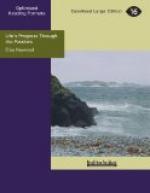Natura, like all children, uncircumscribed by precept, had not only a desire of prying into those things which it was his advantage to know, but also into those which he had much better have been totally ignorant of, and which the discovery of his being too well skilled in, frequently occasioned him much ill will, especially when he was found to have too far dived into those little secrets which will ever be among servants in large families. But reason was not ripe enough in him to enable him to distinguish between what were proper subjects for the exercise of this passion, and what were not so.
That impediment, however, which had hitherto retarded his departure being removed, he now set out for Eton, under the conduct of the abovementioned kinsman, who placed him in a boarding-house very near the school, and took his leave, after having given him such admonitions as he thought necessary for a person of his years, when more intrusted to himself than he before had been.
But Natura was not yet arrived at an age wherein it could be expected he should reap much benefit from advice. A settled resolution, and the power of judging what is our real interest to do, are the perfections of maturity, and happy is it for the few who even then attain them.—Precept must be constantly and artfully instilled to make any impression on the mind, and is rarely fixed there, till experience confirms it; therefore, as both these were wanting to form his behaviour, what could be hoped from it, but such a one as was conformable to the various passions which agitate human nature, and which every day grow stronger in us, at least till they have attained a certain crisis, after which they decay, in proportion as they increased.
As wrath is one of the most violent emotions of the soul, so I think it is one of the first that breaks out into effects: it owes its birth indeed to pride; for we are never angry, unless touched by a real, or imaginary insult; but, by the offspring chiefly is the parent seen. Pride seldom, I believe it may be said, never, wholly dies in us, tho’ it may be concealed; whereas wrath diminishes as our reason increases, and seems intirely evaporated after the heat of youth is over: when a man therefore has divested himself of the one, no tokens are left to distinguish the other.—Sometimes, indeed, we shall see an extreme impetuosity, even to old age, but then, it is out of the ordinary course of nature, and besides, the person possessed of it must be endued with a small share of sound understanding, to give any marks of such a propensity remaining in him.
It is with the utmost justice, that by the system of the christian religion, pride is intitled the original sin, not only as it was that of the fallen angels, but also as it is certainly the fountain-head from which all our other vices are derived.—It is by the dictates of this pernicious passion we are inflamed with wrath, and wild ambition,—instigated to covetousness,—to envy,—to revenge, and in fine, to stop at nothing which tends to self-gratification, be our desires of what kind soever.




